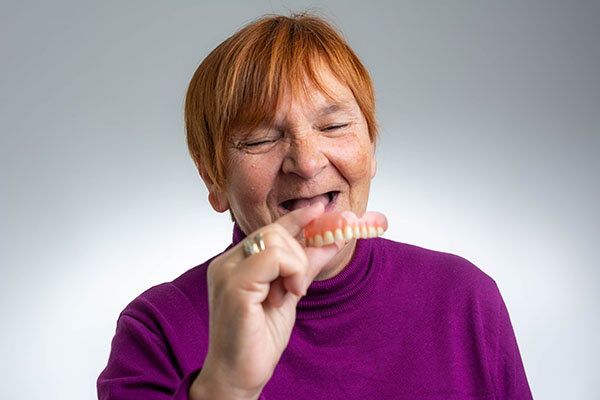 Adjusting to new dentures is a process that usually takes several weeks. You must learn how to eat, speak, and adapt to the feel of having them in your mouth. Though every effort is made to have your dentures fit correctly when they are made, you are likely to need to visit your dentist for adjustments.
Adjusting to new dentures is a process that usually takes several weeks. You must learn how to eat, speak, and adapt to the feel of having them in your mouth. Though every effort is made to have your dentures fit correctly when they are made, you are likely to need to visit your dentist for adjustments.
Adjustments are made for various reasons. Your gums can develop sore spots and inflammation where the dentures touch, the plate might move when you laugh, or you may have difficulty eating. One cause of those problems is that the dentures are loose. Not only are loose dentures uncomfortable, but they also pose a health risk.
What causes loose dentures?
Your gums will be swollen for several weeks after your teeth are extracted and you are adjusting to new dentures. However, as the swelling goes down, your dentures may become loose. The most common reason is bone resorption; your gums will start to shrink because they are no longer holding your teeth in your mouth.
How can you deal with loose dentures?
If your dentures do not fit well, make an appointment with your dentist to discuss your options.
Denture adhesives
There are a few types of denture adhesives available. Denture creams and pastes are applied to your denture plate before you place it in your mouth. Once inserted, you push the denture onto your gum to form a bond. These keep the piece secure, but the paste or cream can be messy and difficult to clean up when you remove your dentures.
Denture adhesive powder also keeps your dentures in place, but it sometimes forms a stronger bond with your gums than creams or pastes do. Powders are spread in a light layer over wet dentures in the areas where they will be in contact with your gums. Powders do not ooze, and your end-of-the-day cleanup is easier.
Cushions or strips are the cleanest types of denture adhesive. They are pre-formed to fit the shape of your appliance and can be cut with scissors if necessary. Wet the cushion and place it onto the denture, then press the denture into place in your mouth. When you remove your dentures, there is no residue in your mouth, and cushions easily peel away from the appliance.
Adjustment by your dentist
Sometimes, loose dentures fit better after your dentist grinds problem areas on your denture plate. However, your dentures may need to be relined if a minor adjustment does not fix the problem.
There are two kinds of relining: Soft and hard. With soft relining, a polymer is added to the inside of the denture tray. The tray is placed into your mouth, and the polymer conforms to the shape of your gums. Hard denture plastic is used for hard relining.
Should you be concerned about loose dentures?
Adjusting to new dentures is easier when the appliances fit correctly. While slightly loose dentures are normal during this period, they are uncomfortable and are a health risk. If your dentures are moving in your mouth, work with your dentist to find the solution that is right for you.
Request an appointment or call Fort Lee Family Dental at 201-620-9772 for an appointment in our Fort Lee office.
Recent Posts
In addition to recognizing the new person in the mirror, adjusting to new dentures requires changing some of a person’s former eating habits. Having a full set of great-looking teeth can give one’s confidence a significant boost, but after spending a considerable amount of time without teeth, it can take a little while to learn…
It is not surprising that adjusting to new dentures takes a little time. After all, you have new items in your mouth, and they will at first feel a little strange. Most people have enjoyed a mouth full of teeth for many years. You will also need to become comfortable chewing foods, drinking liquids, and…
Dentures are devices that fit on the gums where there are missing teeth, ensuring the integrity and structure of the mouth and jaw bone. Although dentures look and feel very similar to natural teeth, adjusting to new dentures is something that all wearers must do while they get used to their new appliance. This period…


